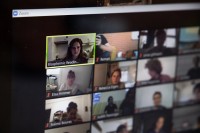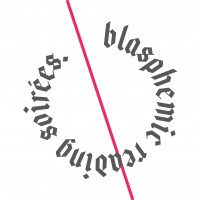Digital Housewives, 09.04.2020, online
“Blasphemic Reading Soirées” ist eine nomadische Plattform für zeitgenössischen Feminismus und ein Format, das (queer-)feministische Texte öffentlich zugänglich macht und Debattenkultur fördert.
2016 in Basel als Undergroundlesekreis gegründet, entwickeln die Macherinnen seit Frühjahr 2018 öffentliche Ereignisse. Unterschiedliche Formate und mediale Übersetzungen von Vor-Lesen und Zuhören ermöglichen einen experimentellen und performativen Zugang zu Texten, deren Fokus auf queerfeministischer Literatur, Popkultur und Theorie liegt. Die Soirées wurden von März 2018 bis März 2019 von Miriam Coretta Schulte und Katharina Brandl konzipiert und moderiert; seit Herbst 2019 sind auch Saskia Läubli und Jonas Gillmann im Kernteam der Soirées.
Die April-Soirée fand in englischer Sprache statt, deshalb auch die englische Beschreibung. Zur Blasphemic Reading Soirée am 09.04.2020:
For the “Blasphemic Reading Soirées”, meeting in actual physical spaces is crucial. The spaces we select to read in, and the texts we select for our discussions always correspond. We think about the performance of our reading bodies and minds in those spaces when we prepare. As the circumstances push people to go digital, we are aware that reading together online can only be a foul compromise for us, but one we are willing to take during these circumstances.
For the 12th edition of Blasphemic Reading Soirées, we therefore feel the need to zoom in on crucial transformations of issues of labour and want to discuss digital consumer labour – the kind of work many of us do around the clock for free. When on social media, we comment on our friends postings, we help each other out – especially now – or we merely click and scroll. By doing all of the above, we produce data for free that are mined by others: unemployment does not equate underemployment, especially not now. Kylie Jarrett’s book “Feminism, Labour und Digital Media. The Digital Housewife” offers us a perspective on our life with digital media. She uses the term of the “digital housewife” to argue for a connection between the unpaid labour that all of us do willingly online and housework, which has been discussed by feminist theory since decades.
It might be a compromise to meet you online, but at least we could find the perfect accomplice for our online-soirée: artist and art mediator Daniela Brugger will join in for the discussion. In her practice, Daniela has repeatedly worked with the issue of social exclusion in digital spaces and she recently developed a workshop for digital self-defense – with artistic means.


